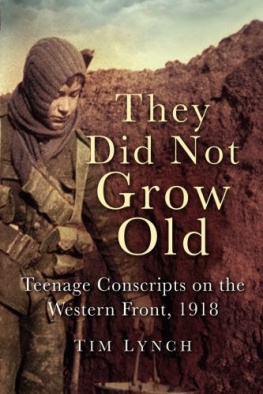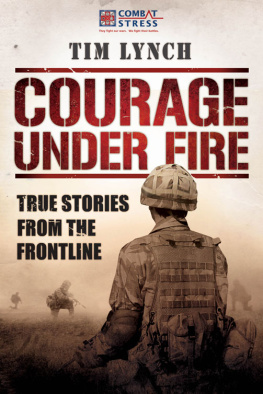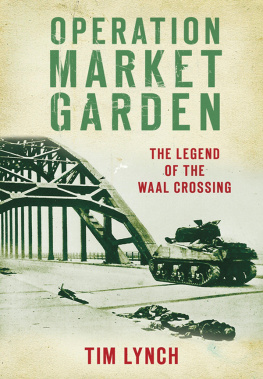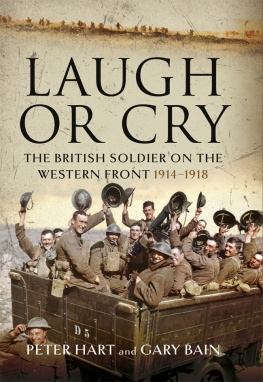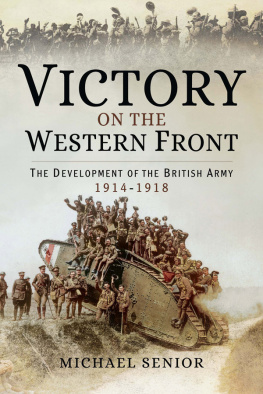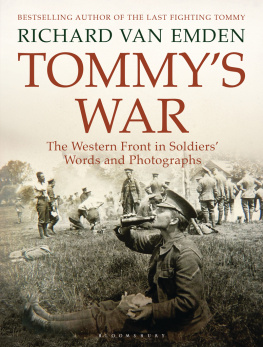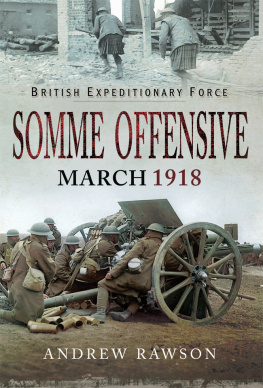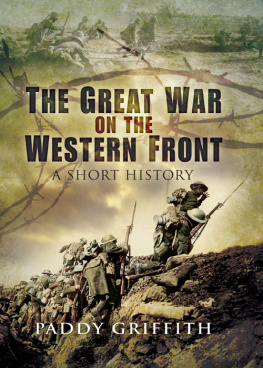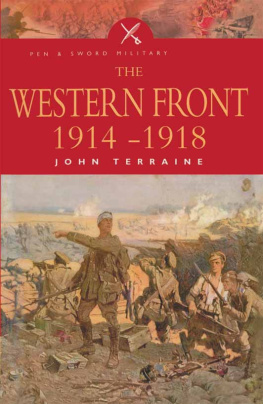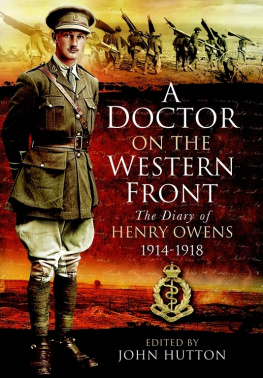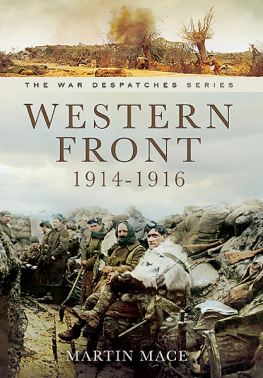
In trying to go beyond the stereotypes and find out who my great uncle, Harold Wiseman, and his friends were and why they fought I have had the help and support of too many people to list in full but special thanks need to go to Alison Hine of the Guild of Battlefield Guides and the University of Birminghams First World War Studies programme, who was extremely generous in her support and encouragement. Thanks, too, to Dr John Bourne and Professor Peter Simkins of the Birmingham course for reading some of my material and providing a much-needed boost to morale with their kind comments. From the Western Front Association, Malcolm Johnson allowed me to steal freely from his work Saturday Soldiers and David Tattersfields enthusiastic interest in the Marne along with his position as Development Trustee provided invaluable assistance in tracking down some vital information. Steve Rogers of the War Graves Photographic Project (www.twgpp.org) found photographs and details of the graves of the draft from his extensive archive.
My mother, Violet, was Harold Wisemans niece and provided her recollections of how his death affected her mother and the rest of the family. Unfortunately she died just before publication of the book. She and my father, Albert, are among the last of their generation born into a country still mourning its dead when another war came. A family holiday to Belgium in 1970 sparked an interest in the First World War and military history that has grown steadily ever since.
As ever, my greatest thanks go to my wife, Jacqueline and my kids, Bethany and Josh (yes OK Josh, and Monty the dog). Writing a book is hard work and they have always been patient when Ive drifted off into my own little world, writing the next chapter in my head or sitting in the car as I tramped across a muddy field in northern France instead of standing in a line at Euro-Disney which was what I was supposed to be doing at the time. Thanks guys.
Tim Lynch
2013
Contents
T hursday 28 September 1899. At the end of a long, hot and stormy summer, Robina Carr cradled her baby for the first time, blissfully unaware that the war that would one day claim him had just moved another step closer. As Robina, the British-born daughter of a German immigrant, proudly introduced their first-born child to his father, British troops were arriving in the diamond mining town of Kimberley in South Africa, where special correspondent J. Angus Hamilton reported:
There is much solemn speculation upon the date of hostilities. The fact is that no one here can, with any certainty, predict an hour. A shot anywhere will set the borderside aflame. Moreover, the Boers are daily growing more impudent. At Borderside, where the frontiers are barely eighty yards apart, a field cornet and his men, who are patrolling their side of the line, greet the pickets of the Cape Police who are stationed there with exulting menaces and much display of rifles. But if the Dutch be thirsting in this fashion for our blood, people at home can rest confident in the fact that there will be no holding back upon the part of our men once the fun begins.
There was, he said, an atmosphere of keen excitement in the town, where crowds of interested spectators besieged the railway station and thronged the dusty thoroughfares of the town. The Imperial men detrained very smartly to the sound of the bugle, off-loading the guns and ammunition to the plaudits and delights of an admiring crowd. For tuppence, British children could buy a Kruger doll complete with a tiny coffin to bury him in, whilst those from poorer families made do with a clay doll and a matchbox. It was, after all, only a matter of time before the might of the British Army crushed the upstarts.
Victory in the Franco-Prussian War of 187071 had led to the amalgamation of the various Germanic states into a unified Germany that under Bismarcks leadership began an aggressive policy of colonisation, making it the third largest player in the late nineteenth centurys scramble for Africa. Now, the Kaisers open military support for the Boers would turn his country long regarded by generations of Britons as sharing a common Saxon ancestry and therefore as a natural ally into Britains chief rival in the struggle for world power. When the Russo-Japanese War of 190405 threatened to draw Britain in to honour its treaty with Japan at the same time as France came under pressure to support its treaty with Russia, it became clear that Britain could no longer follow its policy of splendid isolation from European affairs if it were to be able to defend its overseas territories from its European rivals. The signing of the entente cordiale in 1904 would once again make Britain a part of European politics. As a result, ten years later Britain would join its oldest enemy in battle with its closest kin. All that, though, could mean nothing to John and Robina in their Bradford home on the first day of their sons life. They named him after his father and wondered what life would hold for him.
At that moment, the same scene was being played out in other homes across the West Riding of Yorkshire. High on the Pennine Hills straddling the Lancashire border, railway signalman Fred Pickering and his wife Ada held their third child, Charles Edward. In Halifax John and Mary Jane Ambler welcomed the arrival of their fourth son, Arnold. On the outskirts of Huddersfield, Sarah Whitwams first child Harold was making his presence known just as tailor Thomas Gaines and his wife Ruth gazed upon their son Frederick as he lay sleeping beside his mother in their Leeds home. To the north, in the town of Keighley, the Wiseman family James, Elizabeth and their children James and Christiana greeted the arrival of another son, also named Harold, with a mixture of joy and trepidation. As the family grew, their income had to be stretched further. Gone was the large home on the edge of town and their servant as the family slid slowly down the social scale.
Six boys among the thousands born on that Thursday. Six boys whose lives would be forever entwined by the events of a single day. On 20 July 1918, Arnold Ambler, John Carr, Frederick Gaines, Charles Pickering, Harold Whitwam and Harold Wiseman would rise up together and walk into a champagne vineyard against a barrage of fire they would hear for the rest of their lives. Six ordinary young men, now forgotten even by their families, among the millions who served. This is the story of those unknown warriors.
Introduction
Hamilton, J.A., The Siege of Mafeking (London: Methuen & Co., 1900), pp.434.
Ibid., p.43.
Ibid.
1
T he world those six boys were born into was a harsh one, as Elizabeth Wiseman knew only too well. In July 1898 her second son, Frederick, had died aged just 13 months in the same month as her third son, John, had been born. John had died in January 1899 at the same time as she became pregnant with Harold. By 1911, three of Mary Jane Amblers twelve children were dead, as were two of Ada Pickerings and two of Ruth Gaines; the odds were stacked against a newborn surviving its first year in an industrial town. As historian Gordon Corrigan has shown, the First World War is remembered as four years of carnage on an unprecedented scale that cost Britain a generation of its youth, taking the lives of around 8.3 per cent of the men mobilised for the military approximately one in twelve of those serving. or, put another way, over twice the death rate of the trenches as disease, malnutrition, accidents and even infanticide in poverty-stricken households all took their toll. It was, as reformers were later to argue, a situation in which the infantryman on the Western Front in 191418 stood a greater chance of survival than a baby born in the West Riding of Yorkshire.
Next page
